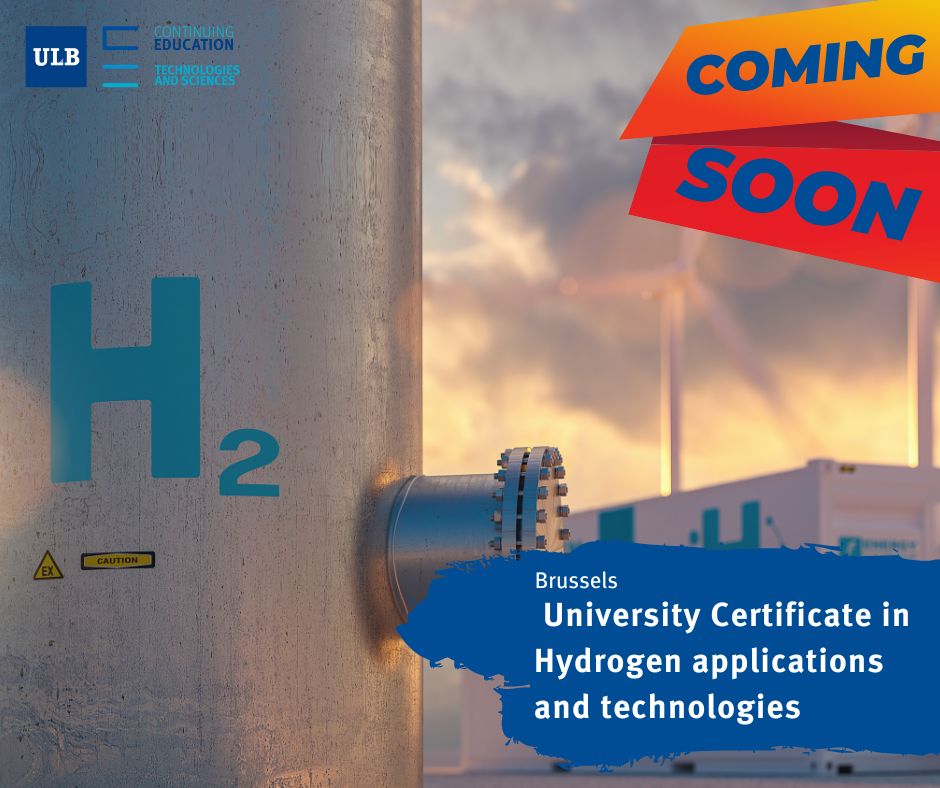- Accueil
- EN
- Studying at ULB
- Find your course
- fctsci
-
Share this page
University Certificate in Hydrogen Applications and Technologies
Accéder aux sections de la fiche
Call to actions
-
Programme titleUniversity Certificate in Hydrogen Applications and Technologies
-
Programme mnemonicFC-857
-
Programme organised by
- Centre de formation continue en Technologies et en Sciences
- Brussels School of Engineering
-
Title typeformation continue
-
Field and branch of studySciences and technics/other
-
Open to returning studentsyes
-
Schedule typeDaytime
-
Languages of instructionenglish
-
Programme durationlong (more than 15 days)
-
CampusSolbosch
-
Category / TopicSciences and technics - Sciences and technics/Sciences and technics - Sciences
-
Contact e-mail
-
Contact telephone
Presentation
Details
General information
Title typeformation continue
Programme durationlong (more than 15 days)
Learning language(s)english
Schedule typeDaytime
CampusSolbosch
Category(ies) - Topic(s)Sciences and technics - Sciences and technics/Sciences and technics - Sciences
Organising faculty(s) and university(ies) Open to returning studentsyes
Prices- Certificate program - regular fee : 3900,00€
- Certificate program - reduced fee: alumni ULB/ ULB staff : 3300,00 €
- Certificate program - reduced fee: groupe fee (minimum 2 subscriptions from the same company) : 2900,00€
- Certificate program - reduced fee; student/ unemployed) : 2900,00€
- Module 1 ( 2 afternoons) (This independent module does not give aces to the certificat) : 500,00€
- Module 2 ( 4 afternoons) (This independent module does not give aces to the certificat) : 1000,00€
- Module 3 ( 7 afternoons) (This independent module does not give aces to the certificat) : 1750,00€
- Module 4 ( 3 afternoons) (This independent module does not give aces to the certificat) : 750,00€
- Module 5 ( 2 afternoons) (This independent module does not give aces to the certificat) : 500,00€
Registrations

Program coordination
- Patrick HENDRICK
- Alexis NSAMZINSHUTI
- Adel EL GAMMAL
- Marie-Mo VAEYENS
- Patrick HENDRICK
- Jean-Luc DELPLANCKE
- Alessandro PARENTE
- Bilal OUTIRBA
- Pierre HENNEAUX
- Axel COUSSEMENT
- Marie-Mo VAEYENS
Contacts
- 22 Friday afternoons – 4 hours each @Solbosch campus ULB
- starting September 2025
To schedule a call with a member of our team, please don't hesitate to reach out via email.
Tentative guest speakers from
- Elia
- Toyota
- Waterstofnet
- Hydrogen Europe Research
- IEA and World H2
- Clean hydrogen partnership
- Materia Nova
- Solhyd
- Colruyt/Virya
- Fluxys
- Sibelga
- Cummins
Presentation
Programme objectives
Schedule
Daytime
- 22 Friday afternoons – 4 hours each
- starting February 2025
- schedule to be fixed (as exemple, last year's schedule available for downloading here)
Programme's added value
As part of the European Hydrogen Strategy, Europe is investing considerable sums in hydrogen-related projects, leading to an increased need for trained hydrogen workers and therefore an increased need for training programmes.
This lifelong learning program leading to an ULB certificate, aims to contribute filling in this gap. ULB has renowned hydrogen experts among its staff, actively conducts hydrogen research, has hydrogen related equipment, and has also a vast network of hydrogen related partners and consortiums.
Calendar & registration
Prerequisites
access conditions
Access to this course requires a higher-education degree in science and/or technology, or equivalent by experience.All admissions are based on a file.
Target audience
Some of the candidates should already be working in energy-related sectors, where the energy transition is a current and recurring issue, requiring constant monitoring of technological developments.
Calendar & registration
Programme
Presentation
Europe has set its sails for a journey towards a low-carbon, zero-emission energy future. To become climate-neutral by 2050, the European energy system is facing an important energy system transition. Renewable and low-carbon gases, such as hydrogen (H) have been attributed a central role in this transition [6].
Hydrogen - with atomic number 1 - is the lightest, simplest and most abundant element in the universe known. At the same time hydrogen has a highly multifaceted and versatile nature. It makes up the largest part of the sun and gaseous planets, and occurs naturally on earth in compound forms, such as the hydrocarbons found in natural gas, coal and petroleum. Hydrogen can be used as energy carrier to store energy, which upon release has a remarkably clean byproduct, since hydrogen in reaction with oxygen merely gives water. Producing hydrogen, storing hydrogen, transporting hydrogen, and applying hydrogen energy systems are all research & innovation areas in expansion.
Program
- MODULE 1 – Introduction
- MODULE 2 – Hydrogen Technologies
- MODULE 3 – Applications
- MODULE 4 – Labs and technical visits
- MODULE 5 – Hydrogen Safety & legislation & permitting

